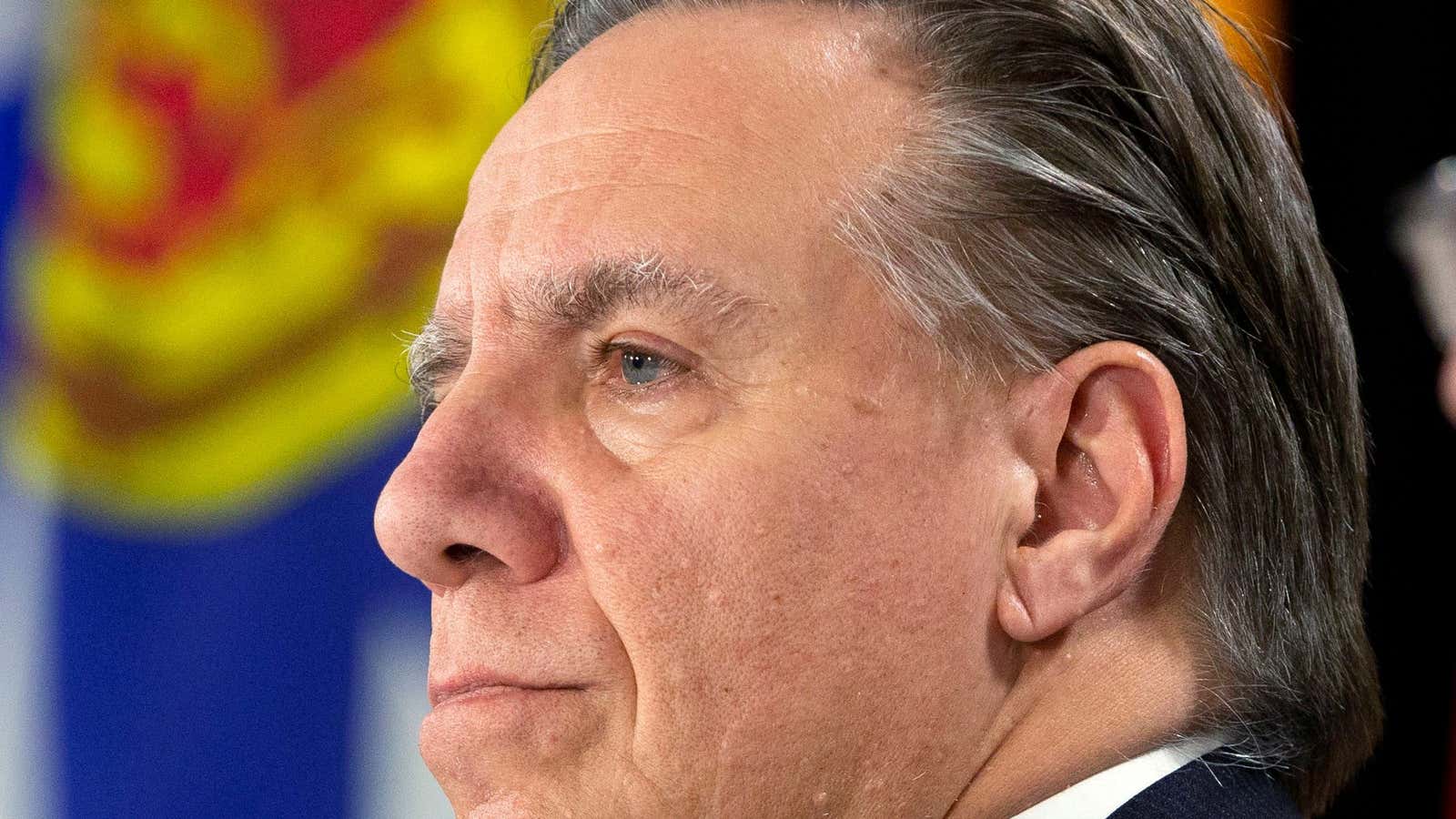The premier of Québec last week warned of a new rule requiring proof of vaccination for anyone entering its government-run liquor and cannabis stores, the only legal outlets for hard spirits and weed in the Canadian province. The move paid off: vaccination appointments spiked, rising to 6,000 bookings the next day, up from an average of 1,500 per day before the rule was announced.
Québec has now followed that strategic carrot with a controversial stick. Yesterday (Jan. 11), provincial premier Francois Legault declared that anyone who is unvaccinated in the province will soon need to pay an additional “health contribution” fee to help cover the costs of caring for the sick and managing disruptions through the pandemic.
Legault has so far only said that the new tax will be a “significant” amount, and not less than C$100 ($80), though anyone who has a legitimate medical reason for not getting vaccinated would not have to pay it.
Vaccination rates in Quebec are already among the world’s highest
Québec’s bold move was unexpected, given that the province’s vaccination rate is as high as that of Ontario, the country’s most populous province, and higher than rates seen in the country’s prairie provinces and many US states. About 85% of Quebecers have received one dose of the vaccine and only about 10% of its residents are unvaccinated, according to the premier’s Facebook post about the levy (link in French).
However, Legault pointed to statistics showing that even though the unvaccinated make up about a thin slice of the population, 50% of the patients in Québec’s intensive care units are unvaccinated. The unvaccinated are nine times more likely to be hospitalized, he said.
Today, there are already signs that even the announcement of the new tax is having the intended effect. On Twitter, Quebec’s health minister Christian Dubé said first-dose bookings jumped the same day Dubé made the announcement. About 7,000 appointments were booked yesterday versus 5,000 Jan. 10
Is taxing the unvaccinated legal and ethical?
Across Canada, the Omicron variant is fueling rapid the spread of Covid-19 infections, increasing cases in long-term care homes and putting pressure on hospitals. In the US, the Centers for Disease Control and Prevention this week advised Americans not to travel to Canada because of the extraordinary degree of community spread there.
Still, taxing the unvaccinated remains unconventional compared to other schemes cooked up by health officials trying to coax vaccine holdouts into booking vaccine and booster appointments. Typically, governments have chosen to lure the hesitant with cash payments or the chance to win big in a vaccination lottery. Last August, in the two weeks following Delta Airlines’ announcement that it would soon start charging unvaccinated employees $200 per month as a health insurance surcharge, 20% of the airlines’ unvaccinated employees got their shots.
But in Quebec, this more sweeping health tax has raised concerns about social unrest in the province, where some citizens have already protested measures—like covid curfews—that have been more restrictive than those of other provinces.
Whether Quebec’s new tax would survive a legal challenge would come down to the details of the emergency measure, which are still being finalized, Carolyn Ells, a medicine and health science professor at Montreal’s McGill University, told Reuters.
Even anti-social people “have rights”
André Picard, a healthcare columnist for the Globe and Mail newspaper, immediately called the contribution fee an unfair punishment Among the 10% of unvaccinated folks in Québec, a tiny faction are the vocal anti-vaxxers who take to the streets and make deceptive claims, he noted. Others are “victims of misinformation, frightened and facing practical barriers to accessing vaccines,” while others have a “well-justified historic mistrust in the system.”
The vaccinated majority—collectively and individually—are understandably frustrated by the unvaccinated, he wrote. However, he added, “the fact remains that people have a right to refuse vaccination. Even anti-social, obnoxious, misinformed and ignorant people have rights.”
